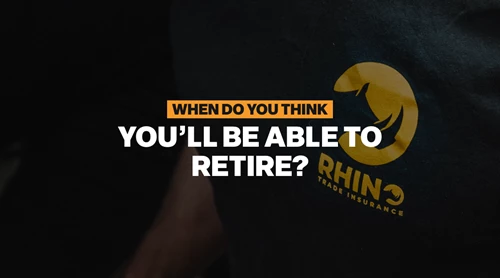
Tradespeople's Pay Rising Faster Than Inflation
Tradespeople’s pay is rising faster than inflation. Learn what’s behind the increase, which trades earn most, and how Rhino can help protect your business and income.
You must be aged between 18 and 75 to be called for jury duty in the UK. Imagine for a moment it was your trial – would you rather see a bench full of teenagers on your jury, or a row of pensioners deciding your fate?
An interesting dilemma, but the truth is most juries are people from a mix of ages and backgrounds and are a truly random bunch of people who just happen to live in the same area. That’s because almost everyone who fits a basic criteria is eligible to be called up to serve.
But what if that letter lands on YOUR doormat? Let’s explore jury service and what actually happens if you’re summoned.
Rhino recently asked 512 tradesmen and women, ‘Have you ever been called up for jury duty?’
The results of the survey showed that 19% of tradespeople HAD been called up to serve on a jury, whereas the remaining 81% had never received a summons. This indicates that it’s surprisingly common to get called up for this civic duty. But how do you know when it’s your time?
First, you’ll receive a letter in the post from the HM Courts & Tribunals Service, informing you that you’ve been randomly selected. It’s not completely random though, as they will have checked beforehand that you’re between 18 and 75, have lived in the UK for at least five years since the age of 13, and you’re registered to vote on the electoral roll.
The letter will tell you when and where you need to show up for the start of the trial, which is usually the closest Crown Court to your address.
Not really. You are allowed to request a deferral, or explain why you’re not eligible (for example, if you’ve had a long prison stretch yourself). You do this by filling in a form that will accompany the letter (and you’ve got seven days to respond).
You might wonder, can I get an exemption as a tradesperson if I have a job booked during that time? No – you wouldn’t be let off just because you’re booked when the trial is on. You’d have to apply for a deferral for a date later in the year, which you can only do once. Which means that even if you’ve got a job on the second time, you’d just have to cancel it. Plus, deferrals are not always granted.
You’ll only be given an exemption for things like:
You received your summons letter, you’ve cancelled your jobs and closed your calendar. Now what?
The first thing to say is, it’s not like the films. It’s not that exciting generally, and there’s a lot of waiting around while the administrative side of the legal proceedings goes ahead. For this reason, it’s best to bring something to entertain yourself, such as an iPad or the huge Sunday newspaper that you never get around to getting through. Obviously, you can’t bust these out while hearing the evidence or deliberating with your fellow jurors, but during the sometimes very long waits in-between court time, you’ll be thankful for the distraction.
There’ll be 11 other people serving with you on the jury, and they will be a total mixed bag. You’re not allowed to discuss the case whatsoever outside of the jury room (such as in the court canteen), but you’re allowed to chit-chat about other things. This may seem a bit difficult, as you may have just witnessed something truly wild inside the courtroom together, but it’s just the way it is. You can be prosecuted yourself for breaking this rule, so it’s not worth it, however tempting it may be.
Most people’s exposure to Crown Court environments (what they call ‘state court’ or ‘federal court’ in the USA) are limited to Netflix dramas. Courtroom environments are nothing to be afraid of, and most of what goes on inside is pretty boring. Of course, you might hear some unpleasant or disturbing testimony during a trial, and your role can be psychologically challenging as you wrestle with an important decision (not to mention discussing it with eleven strangers inside a jury room). Free counselling is provided, provided by Victim Support, which may be very helpful if you’re left feeling a little shaken up.
Jury trials usually last around ten days – but for some difficult or high-profile cases, it can end up running into several weeks.
There are many reasons why people go self-employed, and this is a common question asked by those who get called up to serve on a jury.
Most salaried jobs cover jury service. So, if you had to take ten days off work in a marketing role due to jury service, your employer would almost certainly still pay you for those days.
When you’re self-employed it’s trickier. You have no safety net at times like these. In fact, 25% of Rhino customers said that they don't have enough savings to cover a months worth of expenses (i.e. bills and mortgages).This is where being a fully insured tradesman or woman will come in extremely handy.
For example, if you’re covered by Rhino’s Legal Expenses Insurance, not only will you receive up to £50,000 worth of legal expenses cover if you need it (to help tackle common legal disputes faced by tradespeople), you will also receive up to £100 per day while you’re sitting on a jury.
While it’s true that you can make a claim to HM Courts & Tribunals to cover some expenses, at up to £64.95 per day, it’s unlikely to completely cover your lost earnings and/or any additional costs incurred, such as extra childcare. Also, if you can’t prove that you’re losing funds by being on the jury, then your claim may not be approved.
You’re actually really unlikely to hear this inside of a courtroom, especially here in the UK. This is more a line for the movies, although you will hear ‘All Rise’, which means you’ve got to stand. You might be grateful for this, though, as we’ve got to warn you, court benches are not padded.
If you’ve got any questions about Rhino’s jury duty coverage and Legal Expenses Insurance, give us a call on 0116 243 7904 today.
Tradespeople’s pay is rising faster than inflation. Learn what’s behind the increase, which trades earn most, and how Rhino can help protect your business and income.
Retirement can seem like a distant dream when you’re busy on the tools, but a little planning now can make all the difference later. Rhino surveyed 512 tradespeople to find out when they expect to retire, with answers ranging from under 40 to never!
Running a trades business isn’t easy. Rhino surveyed 512 UK tradespeople to uncover their top concerns for 2024. The biggest worries? Lack of work, rising costs, tool theft, and being undercut by competitors.
Tell us your trade and get a tailored insurance quote for your business in seconds
Our team of experts are available to talk to Mon-Fri 08.30-17.30 and Sat 10.00-14.00

